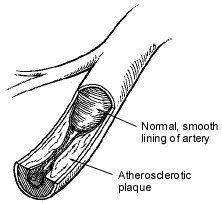
Am Fam Physician. 1999;60(3):903-904
See related article on antioxidant vitamins and the prevention of coronary heart disease.
What can lower my risk of heart disease?
Several things can lower your risk of heart disease:
Exercise regularly.
Don't smoke or chew tobacco.
Eat a diet low in fats and salt.
Eat lots of fruits, vegetables and whole grains.
Certain vitamins might lower your risk of heart attack. These vitamins are called “antioxidants.”
What are antioxidants, and what do they do?
Antioxidants keep cholesterol from going through a process called “oxidation.” Oxidation happens when oxygen reacts with cholesterol in your blood. Oxidation causes the “bad” cholesterol (called “LDL” cholesterol) to stick to the lining of your arteries. The oxidized cholesterol can even block your arteries, so blood can't get through. This blocking is called “atherosclerosis.” (See the picture below.)

Some foods, especially fruits and vegetables, work in your body so this oxygenation process doesn't happen. Vitamin E and vitamin C are probably the best vitamin antioxidants.
If you already have heart disease, vitamin E might reduce your risk of a future heart attack. Vitamin C helps vitamin E work better in your body. It also improves the way your arteries work. Together, these two vitamins help protect your arteries from oxidized cholesterol. They also help your arteries relax and open up more.
Who should take extra vitamin E and vitamin C?
To lower your risk of heart disease, you need to take much more vitamin E and vitamin C than you can get from food. Your doctor may want you to take extra vitamin E and vitamin C if you have had any of the following problems:
A heart attack
Angioplasty (balloon surgery)
Bypass surgery (repair of blocked arteries around the heart)
A stroke caused by a blood clot, carotid artery disease or surgery
Blocked arteries in your legs
High levels of LDL cholesterol or triglycerides (another kind of cholesterol)
High blood pressure
Tobacco use
How much should I take? Are there side effects?
Doctors don't know the ideal dose, but these amounts of vitamin C and vitamin E are reasonable:
Vitamin E: 400 IU a day
Vitamin C: 500 mg twice a day
Most people won't have side effects from this much of these vitamins. You may notice nausea, bloating, an upset stomach or loose stools at first.
If your doctor is going to have you tested for blood in your stool, you shouldn't take vitamin C for three days before you have the test.
Vitamin E acts like a blood thinner if you take 800 IU per day or more. If you're already taking a blood-thinning drug like warfarin (brand name: Coumadin), you should take a lower dose. Check with your doctor.
Good food sources of vitamin E:
Wheat germ
Almonds
Brown rice
Safflower oil
Sunflower oil
Walnuts.
Good food sources of vitamin C:
Sweet red peppers
Oranges
Grapefruit
Broccoli
Strawberries
Kiwi
Kale
Asparagus
Grapefruit
Raspberries
Blackberries
Pineapple
Tomatoes
Do other things in food help too?
“Phytochemicals” may protect you from heart disease and cancer. Phytochemicals are only in foods that come from plants. Here are some examples:
Genisten (in soybeans)
Lycopene (in tomatoes and grapefruit)
Indoles (in cabbage and Brussel sprouts)
Allylic sulfides (in garlic and onion)
Tannins (in green tea)
Flavonoids (in most fruits and vegetables)
You can improve your overall health by eating lots of foods that contain antioxidants and phytochemicals.
Does it help to take a multivitamin every day?
Multivitamins contain a good balance of vitamins, but they hardly ever have the amount of vitamin E and vitamin C that you may need for a healthy heart. You could take a daily multivitamin along with extra vitamin C and vitamin E. Be sure to ask your doctor about this before you take any multivitamin.
For women: If you're still having periods, you should probably take a multivitamin that has extra iron in it. If you aren't having periods anymore, you should take a multivitamin that doesn't have much iron (4 mg or less). If you already have enough iron in your body, extra iron can make oxidation happen. Your doctor can tell you what kind of multivitamin is best for you.